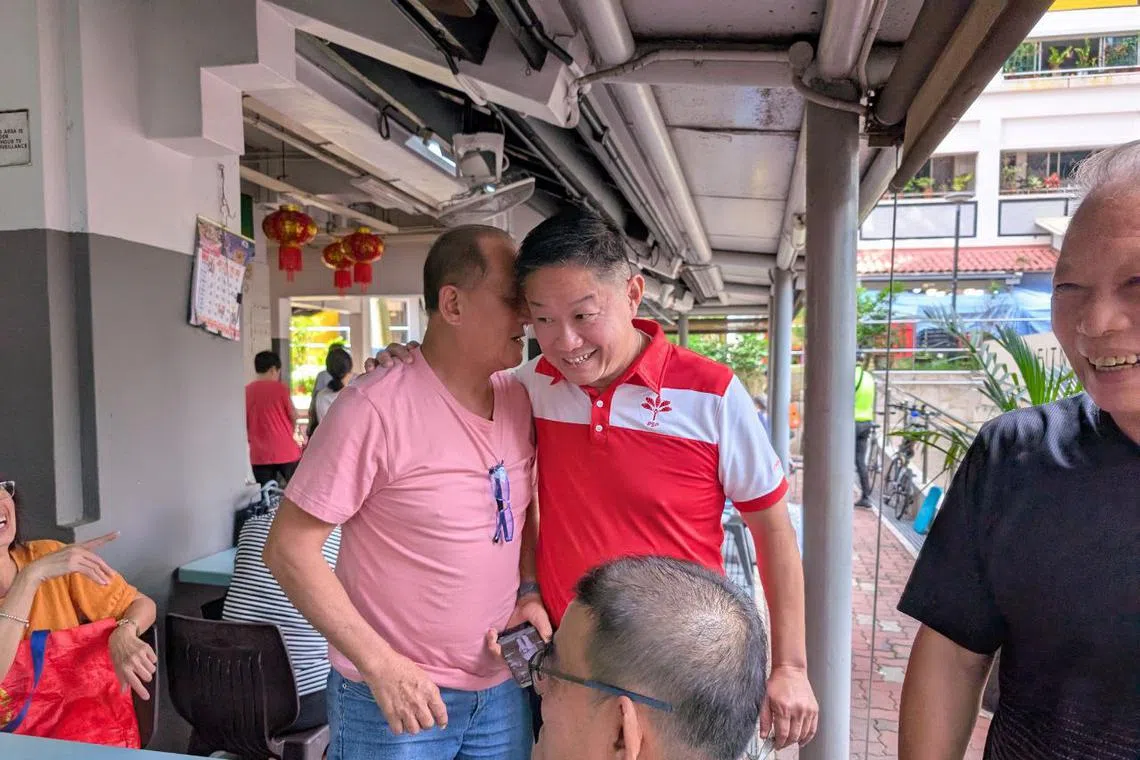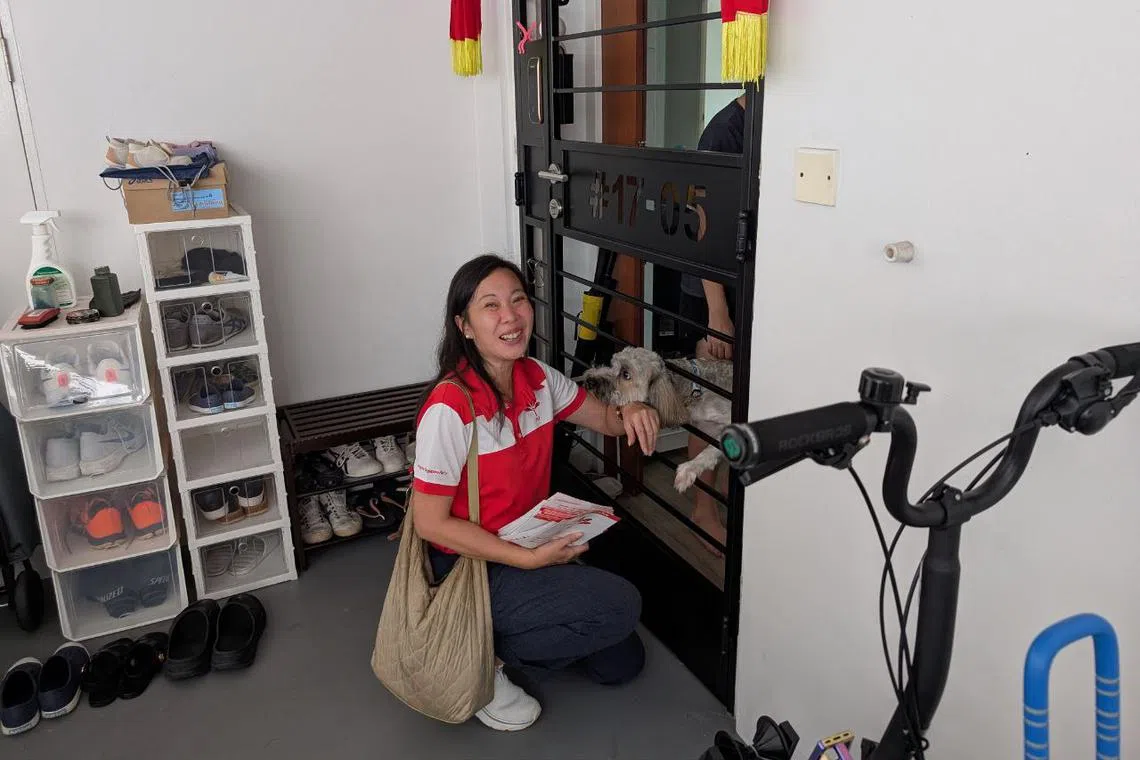GE2025: Minimum wage will lift salaries, drive employers to redesign jobs, says PSP’s Lawrence Pek
Sign up now: Get ST's newsletters delivered to your inbox

Progress Singapore Party’s Lawrence Pek at Teck Whye on April 19.
ST PHOTO: NG SOR LUAN
Follow topic:
Follow our live coverage here.
SINGAPORE - Businesses should be expected to bear the additional costs of a proposed universal minimum wage, which Singapore must consider, in order to draw more local workers back to the workforce amid rising costs of living and automation, said the PSP’s Lawrence Pek.
The opposition party had earlier proposed a $2,250 minimum monthly wage for all Singaporean workers, and is now calling for the Government to study its feasibility.
“The ball is in the Government’s court to properly study it,” Mr Pek told The Straits Times in an interview in Chua Chu Kang on April 29.
Mr Pek, 55, is a new face in the PSP’s four-member slate contesting Chua Chu Kang GRC.
He was rebutting remarks made by Prime Minister Lawrence Wong
Mr Jeffrey Siow, a PAP candidate for Chua Chu Kang GRC, had earlier also cast doubt on the policy’s feasibility
Singapore currently adopts the Progressive Wage Model (PWM), an initiative that aims to sustainably raise lower-wage workers’ incomes by linking wage increases to skills upgrading, productivity improvements and career progression.
But Mr Pek said the PWM is outdated and that a universal minimum wage can be feasibly implemented here.
He said it is up to businesses to reorganise the “shape, size and scope” of their firms to cope with and adapt to the cost of paying higher wages.
“The minimum wage, when imposed by any government, will force business owners to do what we call job redesign,” said Mr Pek.
For instance, companies can expand the roles and responsibilities of employees to justify a higher wage.
“If I choose to have an organisation in Singapore, it is incumbent upon me to redesign jobs based on existing labour and trade laws... such that my company can be profitable,” he said.
Mr Pek, the former secretary-general of the Singapore Manufacturing Federation, which is an advocate for manufacturing firms here, said that much of his views on the policy were shaped when he started a business in China and had to pay a minimum wage there.
As a business owner, he said, he redesigned jobs by merging roles such as finance and human resources, and consolidating overlapping functions in supply chain management and logistics to justify the higher wage.
Asked if fewer people would be employed due to roles being merged, Mr Pek clarified that the PSP’s minimum wage proposal is not to create jobs, but to lift the salaries of lower-wage workers in Singapore to protect them.
He added that the proposal for a minimum wage is not a political tool
This was also in response to Mr Siow’s previous remarks that PSP’s minimum wage policy is more of a political tool than a practical solution.
Mr Pek shared a personal anecdote about a friend in his 60s who had been job hunting for more than a year but eventually turned down an offer that paid $1,400 a month.
“He rejected the job for a very simple reason: How can I live with $1,400?”
While acknowledging that some businesses under cost pressures might opt to pass those costs to consumers should a minimum wage policy be implemented, Mr Pek pointed out that those who resort to raising prices will ultimately lose out.
Organisations will price their goods and services according to demand and supply instead of deciding based on costs, he said, rebutting PM Wong’s comments that companies will raise prices to recuperate their higher wage bills.
“It is wrong to do that. That is an academic understanding of how businesses work,” said Mr Pek.
He said the Government should play a role in supporting companies as they raise wages, adding that the PSP is ready to work with it on the implementation.
Mr Pek, who co-authored an article on the minimum wage policy with economist and former WP MP Leon Perera, said their research began in response to PM Wong’s 2024 interview before taking office as prime minister, where he expressed openness to reviewing policies.
Mr Pek noted that the Government has instead rejected “the very premise of a universal minimum wage”. He said this comes even as thought leaders like former Monetary Authority of Singapore managing director Ravi Menon and former National Wages Council chairman Lim Chong Yah had suggested implementing such a policy, or reviewing it
A minimum wage is unlikely to make a dent in income inequality but can lift the wages of those in the lower income brackets, Mr Menon said then, adding that the policy could complement the PWM.
Mr Pek added that advanced countries like China and Australia have also adopted a minimum wage.
“How do we take this forward? We want to engage the Government in the study of these policies,” Mr Pek said.
He later visited residents in Keat Hong with fellow PSP candidates Wendy Low and S. Nallakaruppan. They commented on other remarks PM Wong made at the Fullerton rally, including how more opposition will weaken the PAP and cause it to lose candidates who are serving as ministers.

PSP's Lawrence Pek greeting residents at Teck Whye Market during a walkabout on April 29.
ST PHOTO: OSMOND CHIA
Mr Nallakaruppan, 60, a stockbroker, said: “If that is the case, then I worry for the Government, because they don’t have the relevant bench strength.”
Ms Low, 48, said that the role of manpower minister, for instance, has seen changes every few years. The current minister, PAP’s Dr Tan See Leng, is also contesting Chua Chu Kang GRC.
The lawyer added: “I think there will be other colleagues of his who can step up to take over that portfolio.

PSP's Wendy Low greeting residents during door-to-door visits at Keat Hong on April 29.
ST PHOTO: OSMOND CHIA
Coalition governments have also been successful elsewhere in the world, she said, citing PM Wong’s comments made in 2024 that opposition parties could potentially win enough seats to form a coalition and run the government this election.
Ms Low said: “That might be a healthier process of making sure that we are getting the best representations to form the Cabinet in Singapore.”


